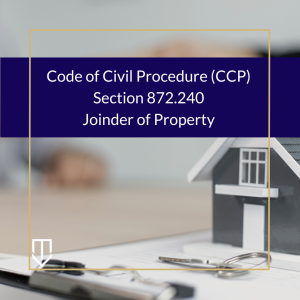 The California Partition Law begins at Code of Civil Procedure section 872.010 and ends at Code of Civil Procedure section 874.323. Section 872.240 allows for personal property to be partitioned with real property. The purpose of Section 872.240 is to give parties an avenue to partition their personal property alongside their real property if they want to.
The California Partition Law begins at Code of Civil Procedure section 872.010 and ends at Code of Civil Procedure section 874.323. Section 872.240 allows for personal property to be partitioned with real property. The purpose of Section 872.240 is to give parties an avenue to partition their personal property alongside their real property if they want to.
Code of Civil Procedure section 872.240 states
Real and personal property may be partitioned in one action.
 California Partition Law Blog
California Partition Law Blog


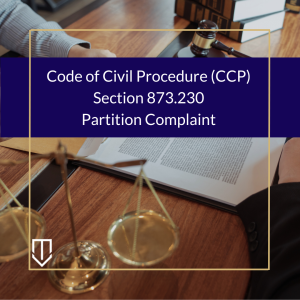 The California Partition Law begins at Code of Civil Procedure section 872.010 and ends at Code of Civil Procedure section 874.323. Section 872.230 outlines the necessary information a plaintiff must have in their complaint. The point of the statute is for plaintiffs to file a proper complaint with all of the content required to initiate a partition lawsuit. If the party files an improper complaint, the court could dismiss the case at the outset.
The California Partition Law begins at Code of Civil Procedure section 872.010 and ends at Code of Civil Procedure section 874.323. Section 872.230 outlines the necessary information a plaintiff must have in their complaint. The point of the statute is for plaintiffs to file a proper complaint with all of the content required to initiate a partition lawsuit. If the party files an improper complaint, the court could dismiss the case at the outset.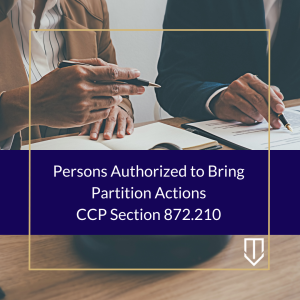
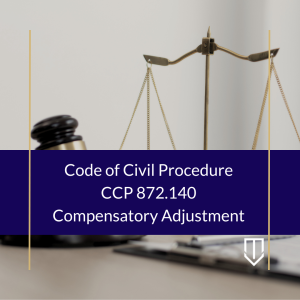 The
The 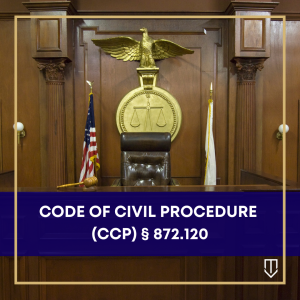 California Code of Civil Procedure section 872.130 expands the court’s authority in an effort to make the court system more efficient when ordering a
California Code of Civil Procedure section 872.130 expands the court’s authority in an effort to make the court system more efficient when ordering a 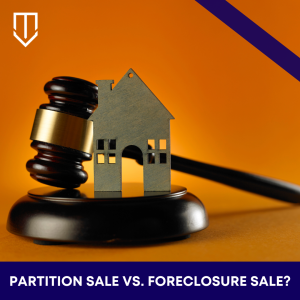 Partitions sales and foreclosure sales are two different ways that a property can be sold. The main difference between the two is the purpose behind the two sales. For partition sales, the purpose is to divide the property and for the owners to get the proceeds in proportion to their ownership. The purpose of foreclosure sales is to pay off a borrower’s loan.
Partitions sales and foreclosure sales are two different ways that a property can be sold. The main difference between the two is the purpose behind the two sales. For partition sales, the purpose is to divide the property and for the owners to get the proceeds in proportion to their ownership. The purpose of foreclosure sales is to pay off a borrower’s loan. 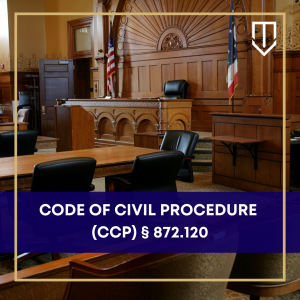 California Code of Civil Procedure section 872.120 grants the court continuing jurisdiction to hear all motions and issue any necessary decrees in order to fulfill the purpose of the partition title, which aims to provide the court with broad statutory authority.
California Code of Civil Procedure section 872.120 grants the court continuing jurisdiction to hear all motions and issue any necessary decrees in order to fulfill the purpose of the partition title, which aims to provide the court with broad statutory authority. 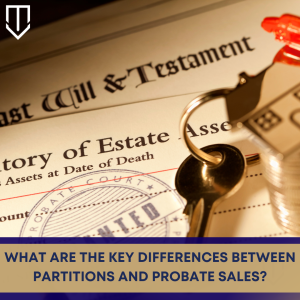 Partitions sales and probate sales are two different ways that a property can be sold. A main difference between the two is that a partition sale is ordered and overseen by the court, while a probate sale is generally overseen by a personal representative, and the court can have minimal involvement. There are also specific steps that the personal representative must take in the probate sale process under California law.
Partitions sales and probate sales are two different ways that a property can be sold. A main difference between the two is that a partition sale is ordered and overseen by the court, while a probate sale is generally overseen by a personal representative, and the court can have minimal involvement. There are also specific steps that the personal representative must take in the probate sale process under California law. 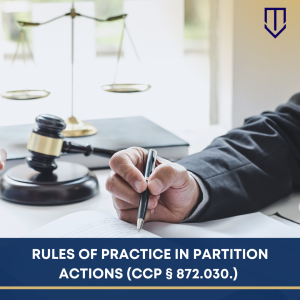 The California Code of Civil Procedure plays a pivotal role in shaping the legal landscape of civil actions. The
The California Code of Civil Procedure plays a pivotal role in shaping the legal landscape of civil actions. The 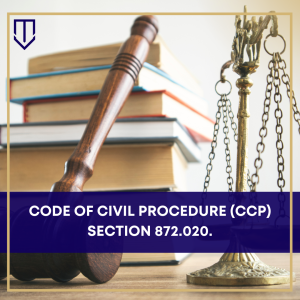 California Code of Civil Procedure section 872.020 is under Title 10.5 Partition of Real and Personal Property. This statute details the scope, or in other words, the
California Code of Civil Procedure section 872.020 is under Title 10.5 Partition of Real and Personal Property. This statute details the scope, or in other words, the